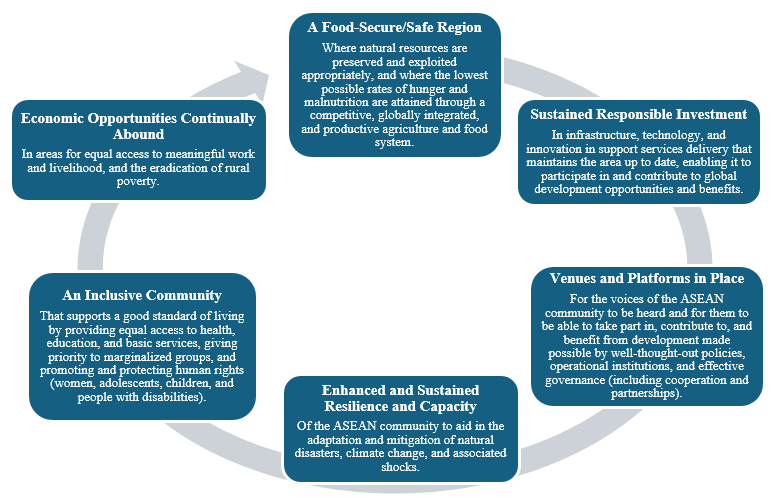Analysis of the ASEAN master plan on rural development of inclusive green villages in Tanjung Lanjut Village
DOI:
https://doi.org/10.37905/drsj.v4i2.89Keywords:
Community, Inclusive Green Village, Rural Development, Sustainable Development Goals (SDGs)Abstract
This research examines the prospects of rural level development according to the ASEAN Framework by proposing the concept of inclusive green villages to tackle challenges such as poverty and environmental degradation. We use Tanjung Lanjut Village in Muaro Jambi as our main case study in highlighting the importance of active community participation in both the planning and implementation of development projects. Furthermore, sustainable investment plays a critical role in achieving significant progress. This study uses qualitative research methodology with data collected through interviews, focus group discussions (FGDs) involving community representatives, and surveys. The analysis is conducted with NVivo software. The findings further reveal that limited access to finance, technological adoption, and weak local institutional capacity are major barriers in achieving inclusive and green rural development. Proposed strategies to address these challenges include improving communication and coordination among stakeholders, strengthening infrastructure, providing capacity-building training for the local community, and facilitating access to sustainable financing. This study emphasize the importance of collaborative efforts among stakeholders, such as governments, communities, and investors to achieve inclusive and environmentally friendly development of rural areas which is in line with Sustainable Development Goals (SDGs) within the ASEAN regional context. The conclusion of this study indicates that rural development, particularly in the ASEAN region, holds significant potential to contribute to the SDGs. By adopting the concept of green, inclusive villages, and focusing on sustainable investment, active community participation, and capacity building, rural areas can achieve inclusive economic growth while addressing environmental challenges. However, the success of such development is dependent on effective resource management, improved living standards, and strong governance practices.
Downloads
References
Al-Taai, S. H. H. (2021). Green economy and sustainable development. IOP Conference Series: Earth and Environmental Science, 779(1), 012007. https://doi.org/10.1088/1755-1315/779/1/012007
BPS Indonesia. (2024). Statistik potensi desa indonesia 2024 (Vol. 15, p. vii). https://www.bps.go.id/id/publication/2024/12/10/2f5217e2d6a695a0830290a7/statistik-potensi-desa-indonesia-2024.html
Braun, J. von, Gulati, A., & Kharas, H. (2017). Key policy actions for sustainable land and water use to serve people. Economics, 11, 1–13. https://doi.org/10.5018/economics-ejournal.ja.2017-32
Budirahayu, T., Mawardi, R. A., Mutia, F., & Rahayu, E. (2025). Inclusive villages and creative economy development: Analysis of social capital in MSME communities in Sidoarjo Regency. Jurnal Mengkaji Indonesia, 4(1), 27–52. https://doi.org/10.59066/jmi.v4i1.1128
Damayanti, R. A., & Syarifuddin, S. (2020). The inclusiveness of community participation in village development planning in Indonesia. Development in Practice, 30(5), 624–634. https://doi.org/10.1080/09614524.2020.1752151
Georgeson, L., Maslin, M., & Poessinouw, M. (2017). The global green economy: A review of concepts, definitions, measurement methodologies and their interactions. Geo: Geography and Environment, 4(1), e00036. https://doi.org/10.1002/geo2.36
Hatu, R. A., Ibrahim, R., Bumulo, S., & Adahati, F. S. (2024). Partisipasi masyarakat dalam pengelolaan dana desa di Desa Biluango, Kecamatan Kabila Bone, Kabupaten Bone Bolango. Dynamics of Rural Society Journal, 2(1), 1–10. https://doi.org/10.37905/drsj.v2i1.47
Huda, S. (2019). Interfaith tolerance model in Balun Village, Lamongan. Journal of Social Science Research, 7(4), 915–920. https://doi.org/10.18510/hssr.2019.74123
Jha, S., Sandhu, S. C., & Wachirapunyanont, R. (2018). Inclusive green growth index: A new benchmark for quality of growth. Asian Development Bank. https://doi.org/10.22617/TCS189580-2
Klarin, T. (2018). The concept of sustainable development: From its beginning to the contemporary issues. Zagreb International Review of Economics and Business, 21(1), 67–94. https://doi.org/10.2478/zireb-2018-0005
Kurniati, T. (2018). Peran perempuan dalam pembangunan desa di Kecamatan Kampung Rakyat Kabupaten Labuanbatu [Undergraduate thesis]. Universitas Sumatera Utara.
Manuputty, F., Loppies, L. R., Afdhal, A., & Litaay, S. C. H. (2023). Menuju desa inklusif: Perencanaan pembangunan berkelanjutan untuk desa adat Negeri Hukurilla di Kota Ambon. SEMAR: Jurnal Sosial dan Pengabdian Masyarakat, 1(3), 27–32. https://doi.org/10.59966/semar.v1i03.453
Mutrofin, M., & Widodo, A. (2020). Kebijakan pembangunan desa inklusif: Analisis monitoring dan evaluasi. Jurnal Pembangunan Daerah, 5(2), 40–56. https://doi.org/10.24235/empower.v5i2.7157
Probosiwi, R. (2017). Desa inklusi sebagai perwujudan pembangunan berkelanjutan bagi penyandang disabilitas. Media Informasi Penelitian Kesejahteraan Sosial, 41(3), 215–226. https://doi.org/10.31105/mipks.v41i3.2255
Sari, D. R., Novi, Y., & Nurul, D. (2025). Inclusive village development model: Integration of counseling services in stakeholder collaboration. Metadata, 7(2), 305–320. https://doi.org/10.47652/metadata.v7i2.642
Sugiyono. (2013). Metode penelitian kuantitatif kualitatif dan R&D. Alfabeta.
Tohopi, R., Nani, Y. N., Tui, F. P., & Abdussamad, J. (2024). Tata kelola kebijakan dana desa dan partisipasi kultural masyarakat desa di Kabupaten Boalemo. Dynamics of Rural Society Journal, 2(1), 11–21. https://doi.org/10.37905/drsj.v2i1.41

Downloads
Published
How to Cite
Issue
Section
License
Copyright (c) 2025 Rts. Nur Rahmawati, Faradina Zevaya, Rohayatul Husna, Thalia Anggraini, Yusi Amelinda

This work is licensed under a Creative Commons Attribution-NonCommercial 4.0 International License.

.png)







